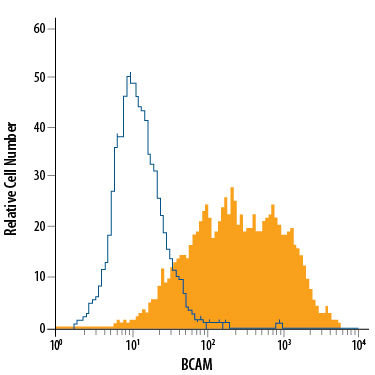Human BCAM Antibody Summary
Glu32-Ala547
Accession # CAA58449
Applications
Human BCAM Sandwich Immunoassay
Please Note: Optimal dilutions should be determined by each laboratory for each application. General Protocols are available in the Technical Information section on our website.
Scientific Data
 View Larger
View Larger
Detection of BCAM in Huh‑7 Human Cell Line by Flow Cytometry. Huh-7 human hepatoma cell line was stained with Mouse Anti-Human BCAM Monoclonal Antibody (Catalog # MAB1481, filled histogram) or isotype control antibody (Catalog # MAB003, open histogram), followed by Phycoerythrin-conjugated Anti-Mouse IgG Secondary Antibody (Catalog # F0102B).
Reconstitution Calculator
Preparation and Storage
- 12 months from date of receipt, -20 to -70 °C as supplied.
- 1 month, 2 to 8 °C under sterile conditions after reconstitution.
- 6 months, -20 to -70 °C under sterile conditions after reconstitution.
Background: BCAM
Basal-Cell Adhesion Molecule (BCAM) and Lutheran blood group glycoprotein (LU) are two alternatively spliced variants of a single immunoglobulin superfamily (IgSF) protein that differ in the length of their cytoplasmic tails. BCAM cDNA encodes a 628 amino acid (aa) residues precursor protein with a putative 31 aa signal peptide, a 597 aa extracellular domain containing three C2 type and two V-type Ig-like domains, a 21 aa transmembrane domain, and a 19 aa cytoplasmic domain. Compared to the 40 aa cytoplasmic domain present in LU, the BCAM cytoplasmic tail lacks the putative Src homology 3 (SH3) binding site that may be involved in mediating intracellular signaling. BCAM/LU has wide tissue distribution and is expressed on erythrocytes, the endothelium of blood vessels and on the basal layer of cells in the epithelia. The expression of BCAM/LU in normal tissues is higher in fetal versus adult tissues. BCAM/LU expression is also upregulated in sickle cell disease red blood cells, in activated keratinocytes and following malignant transformation in some cell types in vivo and in vitro. BCAM/LU has been shown to be an adhesion molecule that binds laminin, a basement membrane protein involved in cell differentiation, adhesion, migration and proliferation.
- Campbell, I.G. et al. (1994) Cancer Research 54:5761.
- Parsons, S.F. et al. (1995) Proc. Natl., Acad. Sci. USA, 92:5496.
- Udani, M. et al. (1998) 101:2550.
- Schon, M. et al. (2000) J. Invest. Dermatol, 115:1047.
Product Datasheets
Citations for Human BCAM Antibody
R&D Systems personnel manually curate a database that contains references using R&D Systems products. The data collected includes not only links to publications in PubMed, but also provides information about sample types, species, and experimental conditions.
4
Citations: Showing 1 - 4
Filter your results:
Filter by:
-
An Anti-Human Lutheran Glycoprotein Phage Antibody Inhibits Cell Migration on Laminin-511: Epitope Mapping of the Antibody
Authors: Y Enomoto-Ok, Y Maeda, N Harashima, Y Sugawara, F Katagiri, K Hozumi, KM Hui, M Nomizu, Y Ito, Y Kikkawa
PLoS ONE, 2017-01-06;12(1):e0167860.
Species: Human
Sample Types: Whole Cells
Applications: Bioassay -
Hydroxycarbamide decreases sickle reticulocyte adhesion to resting endothelium by inhibiting endothelial lutheran/basal cell adhesion molecule (Lu/BCAM) through phosphodiesterase 4A activation.
Authors: Chaar V, Laurance S, Lapoumeroulie C, Cochet S, De Grandis M, Colin Y, Elion J, Le Van Kim C, El Nemer W
J Biol Chem, 2014-03-10;289(16):11512-21.
Species: Human
Sample Types: Whole Cells
Applications: Neutralization -
The lutheran/basal cell adhesion molecule promotes tumor cell migration by modulating integrin-mediated cell attachment to laminin-511 protein.
Authors: Kikkawa Y, Ogawa T, Sudo R, Yamada Y, Katagiri F, Hozumi K, Nomizu M, Miner J
J Biol Chem, 2013-09-13;288(43):30990-1001.
Species: Human
Sample Types: Cell Lysates
Applications: Western Blot -
An antibody to the lutheran glycoprotein (Lu) recognizing the LU4 blood type variant inhibits cell adhesion to laminin alpha5.
Authors: Kikkawa Y, Miwa T, Tohara Y, Hamakubo T, Nomizu M
PLoS ONE, 2011-08-12;6(8):e23329.
Species: Human
Sample Types: Recombinant Protein
Applications: Blocking, Epitope Mapping
FAQs
No product specific FAQs exist for this product, however you may
View all Antibody FAQsReviews for Human BCAM Antibody
There are currently no reviews for this product. Be the first to review Human BCAM Antibody and earn rewards!
Have you used Human BCAM Antibody?
Submit a review and receive an Amazon gift card.
$25/€18/£15/$25CAN/¥75 Yuan/¥2500 Yen for a review with an image
$10/€7/£6/$10 CAD/¥70 Yuan/¥1110 Yen for a review without an image

